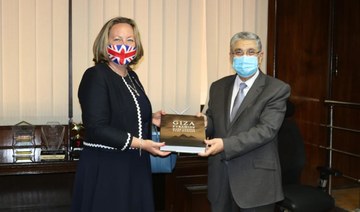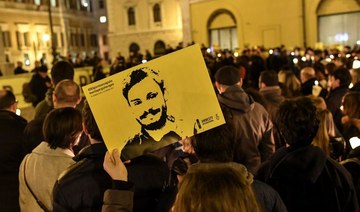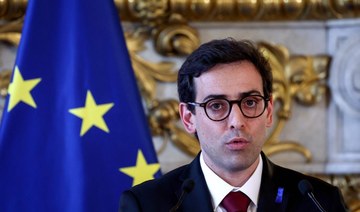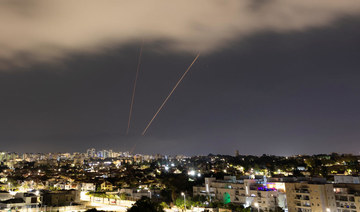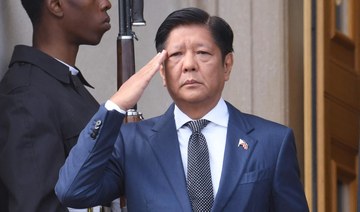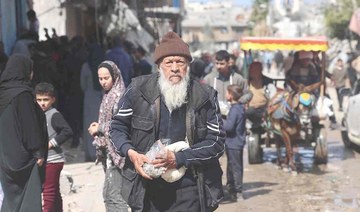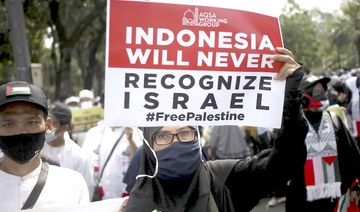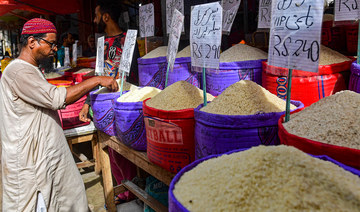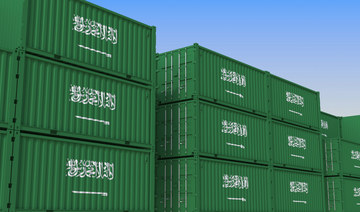CAIRO: The United States is planning to increase funding to Egypt to help it convert to solar energy and move away from fossil fuels, US special envoy for climate John Kerry said in Cairo on Wednesday.
Egypt is “blessed to be the number one country in the world” when it comes to making use of solar energy, Kerry told reporters following meetings with Egypt’s Foreign Minister Sameh Shukry.
Egypt remains reliant on fossil fuels for its energy needs, and a gigantic cloud of air pollution often hovers over its capital of Cairo, home to some 20 million people.
But President Abdel Fattah El-Sisi’s government is taking steps toward renewables. El-Sisi has said that he aims to take greater advantage of the country’s optimal solar and wind conditions for energy harvesting. Officials have said they plan to get 20 percent of the country’s energy needs met by renewables before 2022, and 43 percent by 2035.
Kerry said that switching to renewable energy could help Egypt create jobs as well. Roughly a third of Egyptian citizens live below the poverty line, according to a government study from 2019. And the effects of the coronavirus pandemic have also hit hard the tourism-dependent nation.
Kerry also told reporters that the world has a long way to go before it meets international goals that were set by the historic 2015 Paris climate accord.
President Joe Biden, who has said that fighting global warming is among his highest priorities, had the United States rejoin the historic Paris accord in the first hours of his presidency, undoing the US withdrawal ordered by his predecessor Donald Trump.
Major emitters of greenhouse gases are preparing for the next UN climate summit, due in November in Glasgow, UK The summit aims to relaunch global efforts to keep rising global temperatures to below 1.5 degrees Celsius (2.7 degrees Fahrenheit) as agreed in the Paris accord.
US pledges funding to help Egypt move to solar power
https://arab.news/vanhm
US pledges funding to help Egypt move to solar power
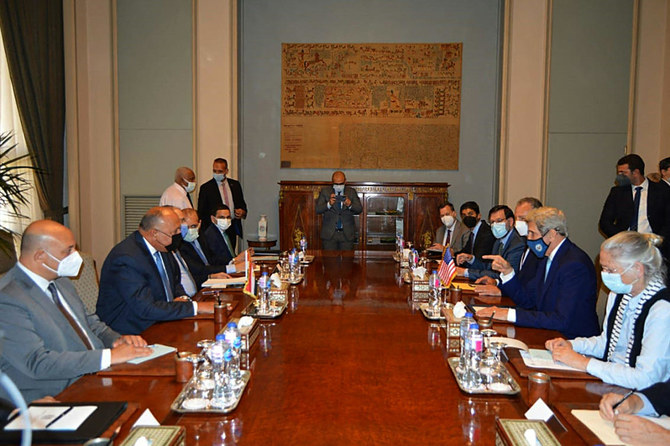
- Egypt remains reliant on fossil fuels for its energy needs, and a gigantic cloud of air pollution often hovers over Cairo
- But President Abdel Fattah El-Sisi’s government is taking steps toward renewables
Reuters photographer wins World Press Photo of the Year with poignant shot from Gaza
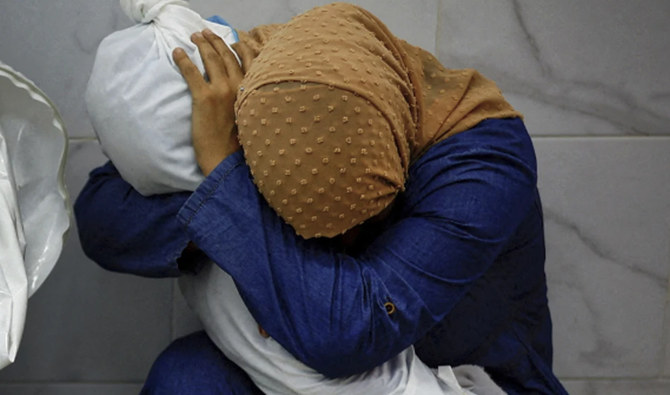
- Mohammed Salem won for heartrending photo of a Palestinian woman cradling the body of her young niece
- Inas Abu Maamar holds five-year-old Saly, killed along with her mother and sister when Israeli missile struck their home
PARIS: Reuters photographer Mohammed Salem captured this year’s prestigious World Press Photo of the Year award Thursday with a depiction of loss and sorrow in Gaza, a heartrending photo of a Palestinian woman cradling the body of her young niece. The photograph, taken in Khan Younis just days after Salem’s own child was born, shows 36-year-old Inas Abu Maamar holding five-year-old Saly, who was killed along with her mother and sister when an Israeli missile struck their home.
Salem, who is Palestinian, described this photo filed Nov. 2 last year, as a “powerful and sad moment that sums up the broader sense of what was happening in the Gaza Strip.”
The image ”truly encapsulates this sense of impact,” said global jury chair Fiona Shields, The Guardian newspaper’s head of photography. “It is incredibly moving to view and at the same time an argument for peace, which is extremely powerful when peace can sometimes feel like an unlikely fantasy,” she added.
The World Press Photo jury praised the shot’s sense of care and respect and its offering of a “metaphorical and literal glimpse into unimaginable loss.”
This is not the first time Salem has been recognized for his work on the Israeli-Palestinian conflict; he received a World Press Photo award more than a decade ago for another depiction of the human toll of conflict in the Gaza strip.
In the three other global categories announced Thursday, South Africa’s Lee-Ann Olwage won Photo Story of the Year for her touching series “Valim-babena,” featured in GEO magazine. The project focused on the stigmatization of dementia in Madagascar, a topic she explored through intimate portraits of “Dada Paul” and his family. Lack of public awareness surrounding dementia means that people displaying symptoms of memory loss are often stigmatized.
In the series, “Dada Paul,” who has lived with dementia for 11 years, is tenderly cared for by his daughter Fara. One of the standout images in the series shows him preparing for church with his granddaughter Odliatemix, capturing moments of normalcy and warmth amidst the challenges of dementia.
Photographer Alejandro Cegarra, a Venezuelan native who migrated to Mexico in 2017, won the Long-Term Project award for “The Two Walls,” published by The New York Times and Bloomberg. Cegarra’s project, initiated in 2018, examines a shift in Mexico’s immigration policies, which have moved from being historically open to enforcing strict regulations at its southern border. The jury said the photographer’s perspective as a migrant gave it a “sensitive,” human-centered perspective, according to a press release.
Julia Kochetova of Ukraine won the Open Format award for “War Is Personal.” The project stood out from coverage of the ongoing conflict by offering a personal look at the harsh realities of war. On a dedicated website, she merged traditional photojournalism with a diary-like documentary style, incorporating photography, poetry, audio clips and music.
The Associated Press won the Open Format award in the regional Africa category with the multimedia story “Adrift,” created by journalists Renata Brito and Felipe Dana. The story investigates the fate of West African migrants who attempted to reach Europe via a treacherous Atlantic route but ended up on a ghost ship discovered off Tobago. The team’s compelling use of photography, cinematography and detailed narrative, enhanced by expert design and multimedia elements, highlights the perils faced by migrants and the human stories behind global migration issues.
The Associated Press’ Ebrahim Noroozi won the Asia Stories award for his series “Afghanistan on the Edge,” which documents the country since the Taliban took over in August 2021.
World Press Photo is an independent, nonprofit organization based in the Netherlands, founded in 1955.
France’s Macron to meet Lebanon PM in Paris Friday: French presidency

- Lebanon has been without a president for more than a year after ex-head of state Michel Aoun’s mandate expired
- Former French colony is also in the grips of an unprecedented economic crisis
PARIS: France President Emmanuel Macron will meet Lebanon’s Prime Minister Najib Mikati and army chief Joseph Aoun on Friday in Paris, the French presidency said.
The announcement on Thursday comes as fears have increased in recent days of a regional escalation in the war between Israel and Hamas in Gaza.
Lebanon is grappling with a deep economic and political crisis.
That has been compounded by near-daily cross-border fire between Lebanon’s Iran-backed Hezbollah group and neighboring Israel ever since war erupted on October 7 between Israel and Hamas, a Hezbollah ally.
Hezbollah on Thursday said two of its fighters had been killed as Israel appeared to intensify strikes on south Lebanon following an attack by the Iran-backed group that wounded 14 Israeli soldiers.
Fears of a regional conflict have spiked in recent days after Tehran launched its first ever direct military attack on Israel late Saturday in retaliation for an April 1 air strike on the Iranian consulate in Damascus widely blamed on Israel.
Lebanon has been without a president for more than a year after ex-head of state Michel Aoun’s mandate expired, with its feuding factions repeatedly failing in parliament to elect a new leader.
The multi-confessional former French colony is also in the grips of an unprecedented economic crisis.
Mikati has been prime minister since 2021 but leads a caretaker government with limited powers.
Joseph Aoun, no relation to the country’s former president, has good relations with all sides in the country and is sometimes put forward as someone who could lead it out of political deadlock.
Macron has visited the country twice in recent years in a bid to help bring it out of crisis, but then in 2023 assigned the task to former foreign minister Jean-Yves Le Drian.
Philippines’ Marcos features among Time’s 100 most influential people
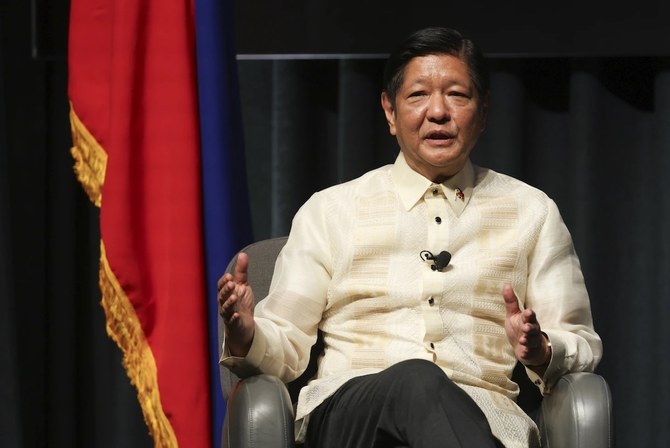
- Other Filipinos previously featured are Rodrigo Duterte, Leila de Lima, Maria Ressa
- Magazine recognizes Marcos’ attempts to rehabilitate the name of his dictator father and namesake
MANILA: Time magazine has featured Philippine President Ferdinand “Bongbong” Marcos Jr. in its list of the 100 most influential people of 2024, which includes other heads of state, celebrities, scientists and tycoons.
First published in 1999, the annual list recognizes people from various fields for making an impact, breaking records or rules. Entrants are featured for making change — regardless of the consequences of their actions.
Marcos, 66, the son and namesake of the late Philippine dictator, won a landslide victory in the 2022 elections. He campaigned on the issue of national unity and portrayed himself as the candidate for change, promising happiness to 110 million Filipinos, weary of pandemic hardships and years of political polarization under his immediate predecessor Rodrigo Duterte.
The magazine recognized his efforts to rehabilitate and “whitewash” the name of his father and also highlighted his other achievements in office.
“He brought technocrats back into government, steadied the post-pandemic economy, and elevated the Philippines on the world stage,” Time’s news correspondent Charlie Campbell wrote.
“Many problems persist, including extrajudicial killings and journalists routinely attacked. But by trying to repair his family name, Bongbong may reshape his country too.”
The article also recognized Marcos for standing against Beijing’s claims in the disputed South China Sea, where Chinese ships have been regularly entering the Philippines’ exclusive economic zone.
Standing steadfast against Chinese aggression has also gained him praise at home.
“His policy on the West Philippine Sea of standing up against China is good,” said Raymond Zabala, a lawyer, who was “optimistic and skeptical at the same time” about Marcos’ inclusion in Time’s list, owing to unanswered issues about his family’s ill-gotten wealth and abuses during his father’s rule.
“Given his family’s background and some of the issues during the election campaign, I can’t help but feel critical.”
While appearing on Time’s list is often seen as an honor, Filipinos said they did not see how their country was improving its reputation, although they were observing fewer human rights violations compared with the previous Duterte administration and its “war on drugs,” which according to rights groups has led to the deaths of over 12,000 people.
“The Philippines will be reverting back to its usual image of a corrupt nation, probably minus the extrajudicial killings,” said Crystal Arcega, a law student.
Writer Pam Musni told Arab News she felt the perception of Marcos’ administration was the same as that of his predecessor’s, although “probably less bloodthirsty” and “more emboldened” against China.
“I understand why he was included in the list, with ‘influential’ not necessarily being a good or bad thing,” she said.
“It is especially frustrating that he does not make any significant strides towards the threat of climate change, and that he has expressed support for Israel, a country that has been killing many innocent lives in Palestine.”
A recent Pulse Asia survey showed Marcos’ performance ratings fell from 68 percent in December 2023 to 55 percent in March.
“I’m still waiting to hear how he plans to assert our sovereignty, since that is always a balancing act with the US,” said sustainable development practitioner J.K. Asturias.
Initially enthusiastic about Marcos’ $160 billion infrastructure plans under his Build Better More program, he has been increasingly critical over lack of support for alternative modes of transportation.
“In recent times I’ve been especially disappointed with how they are banning light electric vehicles even though there is a law that says the government should be incentivizing their adoption. I also feel he does a lot of greenwashing, pretending he’s pro-environment even though he pushes for mining,” Asturias said.
For him, the impression that Time’s list would create was one of the Filipinos’ tendency to forget.
“Many people will most likely see the Philippines as a nation that forgets too soon and forgives too much,” he said. “If they don’t think that already.”
Other Filipinos featured by Time have included Duterte and his vocal critic and former senator Leila de Lima in 2017.
Journalist Maria Ressa was recognized by Time in 2019 — two years before becoming a Nobel Peace Prize laureate.
The late former President Corazon Aquino, a central figure in the ousting of Marcos’ father in the bloodless 1986 People Power Revolution, was Time’s Woman of the Year in 1987.
Indonesia and China make joint call for permanent Gaza ceasefire
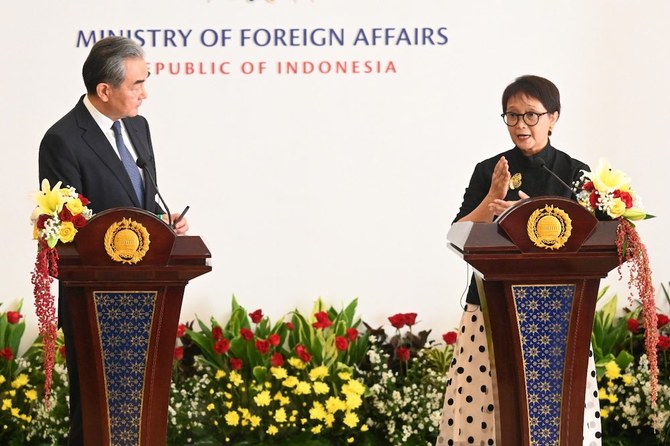
- Countries’ foreign ministers also support Palestine’s bid for full UN membership
- Both officials urge restraint following Israeli, Iranian strikes this month
JAKARTA: Indonesia and China made a joint call on Thursday for an immediate and permanent ceasefire in Gaza, and the implementation of the two-state solution in Palestine.
The move came after a meeting between Indonesian Foreign Minister Retno Marsudi and her Chinese counterpart, Wang Yi, in Jakarta. The two ministers exchanged views on international security and stability amid fears of a regional conflict in the Middle East.
“The visit of the Chinese foreign minister comes at a time when we all have concerns about the evolving situation in the Middle East. We share the same view on the importance of all parties exercising restraint and the necessity of deescalation,” Marsudi told reporters during a joint press briefing.
“I am sure that China will use its influence to prevent escalation. We also shared the same views on the importance of a ceasefire in Gaza and the fair resolution on the issue of Palestine through a two-state solution,” she said.
“Indonesia will support full Palestinian membership at the UN. Stability in the Middle East cannot be achieved without a resolution of the Palestinian issue.”
Wang’s visit to Jakarta is part of a six-day tour that also involves trips to Papua New Guinea and Cambodia.
His meeting with Marsudi followed Iran’s attack on Israel last weekend. The attack was a response to an Israeli airstrike earlier this month that destroyed an Iranian consulate building in Damascus, Syria, killing 13 people, including two top military commanders.
“We urge all parties involved to maintain calm and restraint in order to avoid escalation of the situation, and prevent conflicts from spilling over. China supports the UN Security Council in promptly accepting Palestine as a full member of the UN,” Wang said.
The council is due to vote on Friday on a Palestinian request for full UN membership.
Beijing is also advocating “a larger, more authoritative and more effective international peace conference” that will formulate a timetable and road map to implement the two-state solution.
“Unconditional and lasting ceasefires need to be immediately implemented, and substantive action should be taken to protect civilians. Urgent humanitarian assistance should be sent to Gaza to ensure that supplies can be delivered quickly, safely and sustainably,” Wang added.
Six months on, Israel’s war on Hamas in Gaza has killed more than 33,800 Palestinians as the UN warns of impending famine in the besieged enclave.
Although the UN Security Council in March adopted a resolution demanding an immediate ceasefire during the Muslim holy month of Ramadan, there was no stop in the deadly Israeli attacks.
UK’s Rwanda plan rejected by Lords after vote to exempt Afghan soldiers
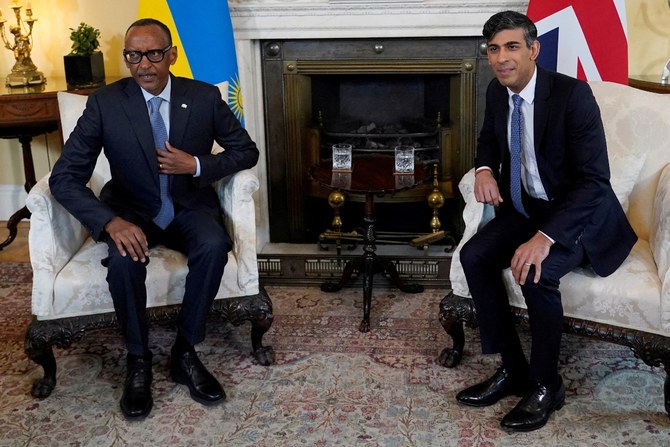
- Peers approve amendment to bill to protect ex-servicemen, families from being deported
- Bill to return to Commons after Lords also vote to set up committee to monitor safety in Rwanda
LONDON: The UK’s House of Lords rejected the government’s plan to send migrants to Rwanda for asylum processing in a vote on Wednesday after it approved two amendments to the legislation.
The upper chamber of Parliament voted in favor of a proposal to exempt Afghans who worked with UK military personnel from being deported to the East African country, and of another that would see a committee established to monitor safety in Rwanda.
The bill will return to the House of Commons early next week, where MPs have previously refused to back amendments made to it by the Lords.
The government of Prime Minister Rishi Sunak, who has made the Rwanda scheme a core part of his pledge to lower illegal migration across the English Channel before the next general election, says the bill in its current form is “the right way forward.”
However, a previous version of the scheme was rejected by the UK Supreme Court in 2023 as unlawful.
The plan has also drawn cross-party criticism for its expense, worries about its effectiveness, the government’s inability to implement it and for the way it treats people in need of asylum, including former Afghan soldiers, translators and their families, many of whom risked their lives to assist the UK during operations in Afghanistan.
Numerous Afghans have been identified as having been threatened with deportation to Rwanda for entering the UK illegally, with many claiming safe legal routes either don’t work in practice or don’t exist.
The Independent highlighted the cases of a former Afghan Air Force pilot hailed as a “patriot” by former colleagues, who crossed the Channel in a small boat, and of two former Afghan special forces soldiers belonging to units known as “Triples” run by the British Army, who were wrongly denied assistance by the UK Ministry of Defence.
Along with reporting by Lighthouse Reports and Sky News, hundreds of other former Triples soldiers have also been identified hiding in Pakistan, awaiting an MoD review after many were refused entry to the UK.
The Lords amendment on protections from deportation for former Afghan military personnel was proposed by a former UK defense secretary, Lord Browne of Ladyton, and supported by two former chiefs of the UK’s defense staff.
Earlier on Wednesday Home Office minister Michael Tomlinson said peers should reject the amendments to “send a clear signal that if you come to the UK illegally, you will not be able to stay.”
But Lord Browne told the Lords: “Now is the time to give these people the sanctuary their bravery has earned.”
He added the government needed to be reminded of “the political consequences of their failure not to give either an assurance that is bankable or to accept this amendment. Because there is little, if any, support in your lordships’ House for their failure to do this and there (is) certainly no majority support in the country to treat these brave people this way.”
Lord Coaker, shadow home affairs spokesperson in the Lords, added: “Why on earth would the government oppose that particular amendment? It’s one of those things that is completely unbelievable.”
On Wednesday, Conservative MP Sir Robert Buckland told the Commons: “There is still a class of people who have served this country, who have been brave and have exposed themselves to danger, who have not yet been dealt with.
“Many of them are in Pakistan, and I think that it would have been helpful to have perhaps seen an amendment in lieu to deal with that point.”



